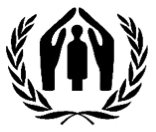1. ASYLUM
In some states the rights and freedoms of the people living on their territory are violated or restricted by the authorities. Such restrictions may be imposed for reasons of race, religion, political opinion or other particular features.
These restrictions may have the form of physical violence, psychological harassment, detention or other police measures, lawsuits, convictions or prohibition to carry out a specific activity, for example: holding public office, going to school, being a member of a certain party, organizing rallies, and others – by and large, the restrictions can be any actions of coercion, discrimination or arbitrariness.
The authority of no country has the right to violate the rights of ordinary people and to restrict their rights outside the scope of the law. Whoever it be – men, women or children, everybody have the right to live freely and in accordance with their mentality and conscience, as long as they do not interfere with other people’s ability to do so.
It sometimes happens that the violations and restrictions are not imposed by the state but by organisations or groupings which the state is not able or does not wish to counter in order to protect those who are their victims.
Some states are affected by wars which threaten the life and security of the civil population. The war could be an armed conflict with another state or an internal conflict among various groupings, sometimes a combination of both.
When a person’s life, security or rights are not protected by the state or the state itself violates them, such a person has the possibility to seek security in another country by applying for the permission of the foreign state to reside in it for these reasons.
This possibility is called “asylum”. In Europe asylum is called “international protection”.
The persons fleeing their country and seeking asylum in a foreign state are called “refugees”.
A person who wishes to settle in a foreign state on his own will for the purpose of employment, education or reunification with his family who is already in that state, is called an “immigrant”.
However, the law does not oblige the states to admit into their territory all foreigners who wish to do so. The states have this obligation only with respect to their own citizens.
This is why the states are entitled to deny admission into their territory to a foreigner who does not hold a valid ID/passport, an entry visa or a residence permit.
Therefore, those who wish to settle in a foreign state for the purpose of employment, education or the exercise of family life, before leaving their country, must apply for and receive a visa from this state. This is the only way for them to travel to the state, enter it legally and receive a residence permit.
When, however, a person enters a foreign state illegally and without a passport or a visa pretending to be a refugee, he will most probably be refused asylum by the authorities of that state.
In such a case this person will be forcefully returned to his country of origin by means of a procedure which is called “deportation” and whose enforcement may require that the person is detained by the police for up to several months.
Under these circumstances this person will also be imposed prohibition on entry (“a black stamp”) which is valid for all the EU Member States, Switzerland and Norway, and usually has a 5-year term of validity.
This prohibition is entered into a special European electronic system, called EURODAC, together with the person’s fingerprints.
This system allows the European states to check by means of the foreigner’s fingerprints at any point in time if prohibition was imposed on that foreigner by another European state and, if so, to refuse him entry and settlement on their territory till the term of the prohibition expires.
European Union
Unlike immigrants, refuges do not leave their country voluntarily and on their own will for economic, family or education reasons. Refugees flee wars, violations of human rights and risks to their life or security.
It is not possible, however, for the Bulgarian state to tell whether a person is an immigrant or a refugee right away.
This is why, similar to the other European states, Bulgaria has introduced a procedure by means of which it examines each individual case and assesses if the person concerned tells the truth and if he has the right to settle in the state as a refugee or does not have this right, as the reasons indicated do not conform to the law.
While a decision is being made on this issue, those who have applied for recognition as refugees in Bulgaria have the right to remain on its territory without being returned either to the neighbouring country from which they entered Bulgaria or to their own country.
Meanwhile and pending the final decision on their issue, these persons are called “asylum-seekers”, as it is not known yet if they will be recognized as refugees in Bulgaria and Europe.
2. REGISTRATION
The law allows any foreigner to lodge an application for asylum in Bulgaria and to request protection and status in order to settle in Europe.
This can be done irrespective of whether the person entered Bulgaria legally or illegally, and of whether he has a valid identity document on himself. If, however, the foreigner possesses any documents, he should immediately present them to the authorities, as this will help speed up the decision on his case.
An application for asylum can be lodged in Bulgaria by any person – a man, a woman or a child. In Europe women have equal rights with men, and have to lodge the application on their own behalf even if they are married.
When children have entered Bulgaria with either or both of their parents, it is the parents that will lodge an application for asylum on behalf of their children but only if the children are aged under 14.
If any of the children has turned 14 years of age, the authorities may require that this child signs its own application, and one of the parents confirms the application by also signing it.
Children who have turned 18 years of age always lodge their own application without the need for one of the parents to sign it.
Children who have entered Bulgaria without a parent or other relatives are called “unaccompanied children”, and have special rights. These children can lodge an application for asylum and status before the Bulgarian authorities independently only by means of their signature.
Asylum can be requested before the Bulgarian authorities in an oral or written form.
An oral application may be made by persons who are illiterate and cannot write.
If you are illiterate, you can ask the police officers with whom you are talking to write your oral application for asylum in Bulgaria. The police officers are obliged to write your oral application, and after that an interpreter speaking your language will read the text of the application for you; if you agree that the written text is the same as what you expressed orally, then you will be given the application to sign it.
As the police, however, rarely have interpreters available on the spot, in most cases assistance is provided by the free-of charge lawyers of the Bulgarian Helsinki Committee who ensure interpreters. The lawyers of the Helsinki Committee work for the United Nations, and regularly visit the police detention facilities at the border and inland.
If you are illiterate, and you are already standing in front of an officer of the Agency for Refugees, you will not have any problems with the writing of your application, as the Agency will always use an interpreter when talking with you.
If, however, you are literate, you had better write yourself in your language the application for asylum. This will allow you to indicate in details the reasons why you left your country, and to describe your experiences and all the events that made you take this decision.
If you have any identity documents or other documents related to your refugee story, you should show them to the police officers or the officers of the Agency for Refugees.
If, when lodging the application for asylum you also submit original documents, the state officer receiving these documents must give you a written record signed by him which precisely lists the documents which you submitted. You must keep this record, as later on you will use it in order to get back your documents, unless the Bulgarian authorities have legal reasons to keep them.
The application for asylum, protection and status in Bulgaria can be lodged before any state authority.
Such applications are most often lodged before the police authorities of Border Police or the Migration Directorate. The reason is that most foreigners enter Bulgaria not via the border points for legal entry, without visas or with irregular documents, as a result of which they are detained by the border or immigration police.
The borders in Bulgaria are guarded by Border Police.
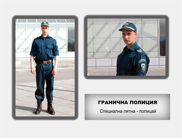 Border police officers wear green police uniforms with the insignia in Bulgarian: “Гранична Полиция” and in English: “Border Police”.
Border police officers wear green police uniforms with the insignia in Bulgarian: “Гранична Полиция” and in English: “Border Police”.
In Bulgaria any entry of a foreigner into the national territory without documents, a visa and via the border strip is illegal and is punished as a crime. When, however, the foreigner is an asylum-seeker, the law exempts him from liability and prosecution. This is why it is important for such a foreigner to declare, immediately after crossing the border, that he seeks asylum before the first state officer whom he encounters – in most cases this is a border police officer.
The border police officers conduct an interview with all the foreigners whom they have detained. The interview is recorded in a written transcript. The transcript will be read out to you by the interpreter and will be signed by you, the interpreter and the police office conducting the interview.
If you did not state that you seek asylum during this interview, you may be taken to court for illegal entry; however, you can still declare your application later on before the prosecutor or before the court.
If, however, after being detained at the border you did not declare that you seek asylum in Bulgaria before the Border Police, the prosecutor or the court, you will be treated by the Bulgarian authorities as an illegal immigrant who must be returned either to the state from which you entered Bulgaria (readmission procedure) or directly to the country of origin (deportation procedure).
In Bulgaria these procedures are carried out by the immigration police called Migration Directorate.

Immigration police officers wear grey police uniforms with an insignia in Bulgarian: “Миграция” and in English: “Migration”.
The immigration police have the right to detain foreigners who do not have regular documents and a residence permit in the special detention centres for irregular immigrants while their readmission or deportation is being organized.
Bulgaria has two detention centres for irregular immigrants – Lyubimetz (near the town of Svilengrad at the Bulgarian-Turkish border), and Busmantzi (near the capital city of Sofia).
Such detention can last up to 6 months, but, in individual cases, it can be extended up to a maximum of 18 months based on permission from the court. After the 18-month term expires, the foreigner will be released, if during his detention the Bulgarian authorities have not made the necessary arrangements for deportation back to the country of origin. While being in detention, you may also be interviewed by the Bulgarian security services called the State Agency for National Security.
If you seek asylum, but you did not manage to declare your asylum application at the border before being transferred to the detention centre, you have the right to file an application before the staff of the immigration police at the detention centre where you are accommodated.
As the immigration police, however, do not have interpreters available on the spot, in most cases assistance for writing the application is provided by the free-of charge lawyers of the Helsinki Committee who also ensure interpreters. The lawyers of the Helsinki Committee work for the United Nations, and regularly visit the police detention facilities at Busmantzi and Lyubimetz, usually on Monday.
After you lodge your application for asylum before the border or immigration police, you will be released within 6 working days.
If your release is delayed, you have the right to file a complaint before the court. You can seek assistance from the free-of-charge lawyers of the Helsinki Committee in relation to the filing of the complaint.
If, however, everything goes well and there is no delay, you will be transferred to an open-type refugee camp.
The STATE AGENCY FOR REFUGEES is the Bulgarian state authority which is competent to examine your case and make a decision on whether you will be granted asylum and status in order to stay in Bulgaria and Europe.
If you entered Bulgaria leally or you entered illegally but were not detained by the police, you can lodge an application directly at any of the refugee camps with this Agency.
When you are already in the camp of the Agency for Refugees, the Agency will officially register you as a foreigner seeking asylum and protection in Bulgaria.
Before being accommodated in a refugee camp, you will be searched for weapons or illegal items. This procedure is called a body search. You are entitled to have the body search carried out by an officer of the same sex, namely men are searched by male officers, and women by female officers.
After that all your documents will be taken from you and kept in custody at the Agency till the completion of your asylum procedure with a final decision. The officer receiving your documents will give you a written record signed by him which precisely lists the documents which you submitted. Keep this record, as later on you will use it in order to get back your documents, unless the Bulgarian authorities have legal reasons to keep them.
Afterwards you will have your photograph and fingerprints taken.
After that you will be asked, if you are literate, to write yourself, and, if you are illiterate, to orally tell your names and date of birth, as well as the names of your parents and brothers and sisters, husband, wife and children, if you have any. It is important that this data should be absolutely precise and complete. The incorrect writing of the names may cause problems after a status has been granted in relation to the issuance of the permanent documents or the issuance of permission for reuniting with family members residing outside Bulgaria.
Upon registration the Agency officers will interview you with the help of an interpreter. The data will be entered into a registration sheet which will be signed by the applicant, the interpreter and the officer.
Afterwards you will be referred to the medical doctor at the camp for medical screening and analyses. While awaiting the results from the various laboratory tests, the applicant may be placed under quarantine in an isolated room, if there are signs that he may be suffering from a contagious disease.
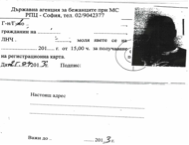
At the end you will be issued a note indicating the date and time when you will receive your temporary document for residence in Bulgaria, called “registration card”.
Such a note may be issued to you even if the registration cannot be done due the lack of an interpreter.
Please, observe strictly the date and time indicated on the note!
After all the registration actions have been completed, you will be accommodated at a refugee camp. Where possible, families are accommodated together in one room.
3. RIGHTS AND OBLIGATIONS
What are my rights during the asylum procedure?
While your application for asylum in Bulgaria (asylum procedure) is being examined by the Bulgarian authorities you have the right to stay in the country, irrespective of whether you entered legally or illegally and whether you have regular national documents for travelling abroad.
This means that the Bulgarian authorities do not have the right to return you to the neighbouring country from which you entered Bulgaria (readmission procedure) or to the country of origin (deportation procedure).
The law stipulates that these procedures shall be automatically suspended till your asylum procedure is completed with a final decision on your case. If you received a decision refusing to grant you asylum and status, but you did not appeal it before the court or you appealed it but the court upheld the refusal of the Agency, such a decision will become final.
If you are lodging an application for asylum in Bulgaria for the first time, you have the right to be accommodated in a camp with the Agency for Refugees.
Families have the right to request that they are accommodated together.
Brothers and sisters also have the right to be accommodated together, irrespective of whether they are children or adults.
Unaccompanied children who are in Bulgaria without their parents or other relatives have the right to ask for accommodation in separate rooms which are only for children or families, as well as the right not to be accommodated with unknown adults in the same room.
If, however, you already have an application which was examined and a decision was made by the Bulgarian authorities, and you lodged a second or another repeated application, you will not be entitled to accommodation by the Agency for Refugees and will have to ensure accommodation by yourself. If, however, you are a person belonging to a vulnerable group or with special needs, you may receive accommodation and food even if you lodged a repeated application. The law defines as vulnerable persons children, persons with disabilities, pregnant women, single parents with children aged under 18, victims of human trafficking, persons with serious health problems, mental disorders or survivors of torture, rape or other forms of mental, physical or sexual violence.
Bulgaria has several refugee camps on its territory:

PASTROGOR CAMP
Address: the village of Pastrogor 6519,
Svilengrad municipality,
Haskovo region

HARMANLI CAMP
Address: Harmanli 6450,
23,Droujba neighbourhood
Haskovo region

BANYA CAMP
Address: the village of Banya 8914,
Nova Zagora municipality,
21, Mineralni bani area
Stara Zagora region

OVCHA KUPEL CAMP
Address: Sofia 1618,
Ovcha Kupel neighbourhood,
21A, Montevideo str.

VRAJDEBNA CAMP
Address: Sofia,
Vrajdebna neighbourhood,
270, Botevgradsko shosse blvd.

VOENNA RAMPA CAMP
Address: Sofia,
Voenna rampa-iztok neighbourhood,
11, Lokomotiv str.
If you want to have accommodation outside the refugee camp, you need to have enough money to cover your rental costs for the duration of the asylum procedure. You should bear in mind that the procedure may take longer – from several months up to one year or more. In addition, you have to find accommodation by yourself and sign a rental contract with the owner who has to show the documents for the ownership of the lodging to the Agency for Refugees. This is a requirement to be met in order for the Agency to indicate the new address on your registration card.
After you have once chosen accommodation outside the refugee camp, it will be extremely difficult to get permission to go back to the refugee camp, in case you run short of money or have another reason.
This is why whenever you decide to change your address or your telephone number, you must inform the Agency for Refugees by filing a written application in order for your new address to be entered in your registration card. Otherwise the Agency will not be aware of the address to which they can send you the invitation for the interview as a result of which your procedure may be terminated and you may lose your rights in Bulgaria.
This must be done whenever you change your address. Otherwise, in addition to the procedure, you may also have trouble with the police.
The Agency also has a closed-type refugee camp. This camp differs from the detention centres run by the immigration police in Busmantzi and Lyubimetz. The Agency for Refugees usually accommodates there persons who have committed serious or repeated violations of the internal rules in the refugee camps or other serious violations of the public order or even crimes, for example, repeated attempts to illegally leave Bulgaria. Such closed-type refugee camps may also be used for detaining persons in respect of whom attempts are made to establish their real identity. In these cases the asylum procedure for such persons may be completed while they are accommodated in the closed-type refugee camp. The accommodation in a closed-type refugee camp may be appealed before the court.
The persons who are in an asylum procedure and are accommodated in a refugee camp are entitled to receive three meals per day.
The meals are provided by the Agency for Refugees in the form of cooked or packaged food. The food is in conformity with the religious restrictions observed by the majority of those accommodated in the camps; this is why pork meat is avoided by way of principle.
The food for three meals (breakfast, lunch and dinner) is distributed twice a day for adults.
Unaccompanied children who are in Bulgaria alone without their parents or relatives are entitled to have their food distributed three time a day.
Several days after being registered as an asylum-seeker you will receive your registration card which look like that:
The card contains the following data:
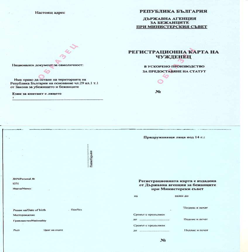
- name and a photograph
- date of birth
- sex (man or woman)
- place of birth
- nationality (citizenship)
- accompanying children aged under 14
- your personal number in Bulgaria
- the address of your accommodation in Bulgaria – a refugee camp or accommodation outside the camps
- the area surrounding the camp in which you are allowed to move without the explicit permission of the Agency for Refugees
This card serves to certify before the Bulgarian authorities that you are an asylum-seeker and are entitled to stay in Bulgaria till your procedure is completed with a decision on your case.
The registration card is a temporary document. The card usually has a 3-month term of validity which can be renewed without any problems while the procedure is still underway and till the decision on your case becomes final. This means that the registration card can also be renewed during court procedures.
You have to regularly renew the validity of your registration card at the Agency for Refugees, as when it expires the card is no longer valid and the police has the right to detain you.
If you lose your card, the Agency for Refugees will sanction you for your negligence with a fine in the amount of 50 up to 200 BGN before issuing a new registration card.
If, however, you have already lodged an application which was examined and a decision was issued by the Bulgarian authorities, and you lodge a second or another repeated application, you will not be entitled to a registration card unless the Agency for Refugees makes a decision to open a new procedure for you.
While you are in the asylum procedure the Bulgarian state will pay your health insurance. The health insurance is thus provided only for the duration of the procedure. Before you receive medical treatment, you have to be examined by a family doctor. In order to be referred to a family doctor, you need to approach the medical facility in the camp of the Agency for Refugees where you are accommodated or to seek assistance from the mediators of the Bulgarian Red Cross (BRC) or the Council of Refugee Women.
Thus you have the right to receive free healthcare during the asylum procedure, but not for all types of medical treatment. Some types of medical care – for example, surgery, dental interventions, are not included in the health insurance package, and you must pay for them the same way as Bulgarian citizens do.
Children aged up to 18 are entitled to free education in Bulgarian state or municipal schools.
In relation to enrolling the children in a school you can approach for help both the Agency staff in the camp where you are accommodated and the organisations of the Bulgarian Red Cross (BRC), Caritas or The Council of Refugee Women.
Persons with special needs – for example, pregnant women, unaccompanied children, families with many children, persons with chronic diseases are entitled, while being in the procedure, to file an application before the Bulgarian social services in order to receive additional assistance.
In relation to filing an application for additional social assistance, you can approach for help the Agency staff in the camp where you are accommodated, as well as the organisations of the Bulgarian Red Cross (BRC) or The Council of Refugee Women.
During the asylum procedure you have the right to work legally. In order to exercise this right you have to file a written application to the director of the refugee camp where you are accommodated or, if you are accommodated outside a camp, to the director of the camp where your procedure is conducted.
You can do this within 3 months after you were registered by the Agency for Refugees.
In addition to rights, you also have obligations during the asylum procedure.
As an asylum-seeker, you are obliged to observe the laws of the Bulgarian state.
Firstly, this means that you cannot make attempts to illegally leave Bulgaria. Any attempt to illegally cross the border is a crime. You were not punished for your illegal entry into Bulgaria, because you declared your wish to seek asylum before the police, the prosecutor or the court. It often happens, however, that even refugees are convicted for illegal entry, when they do not declare in due time that they want to apply for asylum and status in Bulgaria. You might not even be aware that you have been convicted, as this prosecution takes place in a 3-day accelerated procedure, the sentence is usually conditional and its enforcement is suspended till a repeated offence. An illegal exit, however, is always punished with a sentence by the court, without any exception. If you were convicted for illegal entry and were subsequently apprehended in illegal exit and punished for that, then you will have to serve two sentences and will end up in prison.
Your registration card indicates an area of movement. This means that you cannot leave this area without the permission of the director of the camp. In order to get permission, you have to file a written application to the director of the camp and point out where you want to go, how long and for what reason you will be there. The director of the camp will issue a permit which will allow you to leave the area of movement, as determined for you, without any problems. Make sure you check the validity of your permit, and, if necessary, renew the permit by taking the same actions as for its issuing. You do not need a permit for leaving the area of movement when you go to see a doctor or if you received a subpoena from the court where you must appear on a certain date.
If your accommodation is ensured by the Agency for Refugees, you are also obliged to observe the internal rules of the refugee camp and not damage any property items in the room or in the shared spaces. In case you have inflicted such damage, the staff of the Agency for Refugees can sanction you with a fine in the amount of 50 up to 200 BGN.
You are also obliged not to leave the camp without permission and spend the night elsewhere, even for one single night. You may spend more time outside the camp, but you have to file a written application to the director of the camp and request permission to do so. Otherwise your absence from the camp will be registered, and you may be evicted from the camp and not allowed to stay there any more.
Lastly, one of your most important obligations is appearing before your interviewer whenever you receive a note, a letter or another notification with a date and time indicated on it. It is on this date and time that you must appear before the administration of the camp on whose list of asylum-seekers you are registered and which conducts your asylum procedure. If you do not appear on the date and at the time indicated, your run the risk of having your procedure terminated, and thus lose your rights as an asylum-seeker in Bulgaria.
About your rights and obligations after receiving asylum and a status in Bulgaria, please, read the information in the section “Refugee or humanitarian status”.
4. PROCEDURE
After you have been registered, a person from the staff of The Agency for Refugees – a man or a woman – will be designated as responsible for your case. This person is called an interviewer. Please, remember the name of your interviewer.
The first thing the interviewer will do is deciding whether your case will be examined in Bulgaria or in another European state. The decision-making process for this purpose is called a Dublin procedure.
This is why, only if you have relatives in another state of the European Union who were already in that state before you entered Bulgaria, you can request to be sent to that state and have your application examined there. You must, however, also meet the following additional conditions:
- You are aged under 18, and you have a father, mother, brother, sister or grandfather or grandmother in the other state;
- or your husband or wife is in the other state;
- or your minor child (or children) is in the other state.
The Agency for Refugee, however, will not consider this issue at all, if they do not know that you have family members (a spouse, children aged under 18) or other relatives in another European state.
If you have such family members or relatives, you must declare this before the interviewer from the Agency for Refugees upon your registration, and show documents – originals, copies or electronic files on your telephone – certifying your marriage, the children’s birth, your family relationship, as well as their documents certifying residence in the other European state.
In addition, you must sign a written declaration with your consent that Bulgaria sends you to the other European state. Such a declaration has to also be signed by your relative living in the other European state and sent to the Bulgarian Agency for Refugees – by post, fax or e-mail. The declaration signed by your spouse, child or relative has to indicate your consent to join them.
The best thing would be appoaching, immediately your registration, the lawyers from the Helsinki Committee. They will help you with the documents and with initiating the procedure for your transfer from Bulgaria into the other European state where your family or relatives are.
European Union
The asylum procedure conducted by the Agency for Refugees is used to make a decision on whether you will be allowed to remain in Bulgarian and what type of status will be granted to you – refugee status or humanitarian status.
For more information about the difference between the two statuses, please, read the section “Refugee or humanitarian status”.
In order to make this decision, the Agency for Refugees will ask you to appear for an interview.
They will do this by giving you a document to sign, which indicates the date and time when you must have the meeting with the interviewer from the Agency who has been designated to examine your case.
What do you have to do during the interview?
Tell about the reasons for leaving your country of origin with all the details. When possible, indicate the exact dates of the events that you are describing, if you can recall them. Do not invent and do not present any false information! This can easily be detected by the interviewer, and will have a negative effect on your case. Do not forget that you bear the whole responsibility for the information and the data about yourself which you present during the interview.
Tell your real names, because if you do not so and you receive a status, you will not be able either to use your original national documents which are also valid in Bulgaria (for example, an education diploma, a driver’s license) or to be reunited with your family and relatives. If you notice that your name was not correctly written during the registration, inform about this during the interview.
Submit documents which prove your story, if you have such documents. This will help speed up the decision on your application for asylum.
During the interview you are entitled to have an interpreter speaking a language that you understand. You can ask for another interpreter, if you do not understand the one designated for the interview. You also have the right to ask that your interview is conducted by an interviewer and an interpreter of the same sex as you – a man or a woman.
The transcript of the interview must be read out to you in a language that you understand before it is given to you to sign it. If your statements are not recorded precisely, this may negatively affect the decision on your status.
The interviewer must make a decision on your case within 3 months from your registration. If your procedure has to last longer, the interviewer must inform you in writing about such an extension. If in the meantime you decide to voluntarily terminate the procedure by withdrawing your application, you should bear in mind that you will lose your rights as an asylum-seeker in Bulgaria.
The interviewer’s decision indicates if you will be granted or refused a status in Bulgaria. This decision is made in writing, and the interviewer will call you in order to inform you about the result from the procedure on your case.
When you are served the decision, it must be read to you by an interpreter in a language that you speak and understand, and you must receive a copy of the decision against your signature certifying the receipt.
If you are accommodated outside the refugee camps, you may receive by post a letter from the Agency for Refugees informing you that your decision has been issued. This means that you must immediately go to the relevant refugee camp where you were interviewed in order to receive the decision against your signature certifying the receipt.
You may once have been refused by the Agency for Refugees to be granted a status in Bulgaria.
If you did not appeal this refusal before a Bulgarian court or you appealed it but the court upheld the refusal, then you lose the right to stay in Bulgaria.
In that case the Agency for Refugees will refuse to extend the validity of your registration card and will take it back.
In this situation you may be detained (arrested) and returned (deported) to your country of origin by the Bulgarian immigration police. In such cases the police will also impose a prohibition on entry into Bulgaria for 5 years which is also be valid for all the other states of the European Union.
The law allows you to lodge another application, a repeated application, before the Agency for Refugees in order to stay in Bulgaria as a refugee.
Within 2 weeks (14 days) from the registration of your repeated application the Agency for Refugee will make a decision on whether it will open a new asylum procedure for you or will refuse to re-examine your case.
Whatever decision is taken, the Agency for Refugees must serve this decision on you against your signature certifying the receipt. If the decision is a refusal to have your case re-examined, you have the right to lodge an appeal before the court.
The appeal before the court must be lodged within 7 days from receiving the refusal against your signature certifying the receipt!
- Do not miss this deadline! If you do not lodge the appeal within this time limit, the court will not examine it, and you will lose the right to have your case re-examined.
- Seek immediately assistance from the lawyers of the Helsinki Committee or from another lawyer!
European Union
5. APPEAL
The decision on your asylum procedure may be positive: you are granted a status (refugee or humanitarian), but it may also be negative: you are refused a status.
The staff of the Agency for Refugees are obliged to give you a copy of this decision against your signature certifying the receipt; before receiving it, the decision must be read out to you by an interpreter in a language which you speak and understand.
If the decision issued on your case refuses the granting of either a refugee or a humanitarian status, and you disagree, you have the right to lodge an appeal before the court and request that the court repeals that decision and orders that the Agency for Refugees grant you a status.
Do not refuse to sign the decision and take a copy of it. Even if you do not sign the decision refusing a status, the time limit for appealing it before the court will continue running. Moreover, you need the decision refusing a status, because, in case you want to appeal against it, you will have to immediately take it to a lawyer. The lawyer needs this negative decision in order to write the appeal claim, as its text contains the grounds on which you were refused a status.
If you do not lodge the appeal within the time limit indicated in the decision, the court will not examine it, the decision refusing a status will become final, and your asylum procedure in Bulgaria will be terminated. Then the Bulgarian authorities will have the right to return you to your country of origin.
When you lodge an appeal you do not pay a fee, as according to the law the court proceedings in these cases are free-of-charge.
You are advised to use the services of a lawyer for the writing and lodging of the appeal.
It is advisable to use the services and assistance of a lawyer, especially to write and file an appeal against a refusal decision.
If you wish to file an appeal against the Refugee Agency's refusal, contact a lawyer as soon as you have received the decision so that you do not miss the appeal period.
If you already have a free public defender who assisted you during the refugee procedure, you should contact him or her immediately to help you file an appeal. The public defender who has been appointed to assist you before the Refugee Agency or before the courts, is working for the State National Legal Aid Bureau.
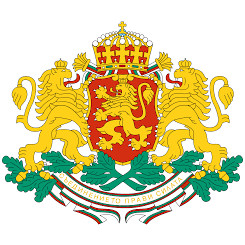
NATIONAL LEGAL AID BUREAU
Sofia 1421, 1 Razvigor Str.
National telephone
for legal assistance: 00359 70018250
Web site: www.nbpp.government.bg
Working hours: 9:00 am – 5:00 pm
Legal aid centers: https://mjs.bg/home/index/7fad28f3-f00e-4d7a-86c3-a570762aca1e
|
Therefore, the NLAB’s public defenders have no right to demand payment from the asylum seekers in order to represent them and defend them in court since they are paid for by the Bulgarian state. The public defender who was assigned to you during the refugee procedure - before the Refugee Agency or in court - is free!
|
If possible, always consult a lawyer when you do not know your rights or cannot decide how you should handle a situation.
The procedures before the court are different and depend on the asylum procedure conducted before the decision on refusing a status was made.
If the decision refusing a status indicates a 7-day term for filing the appeal, this means that the decision was issued after an accelerated asylum procedure or after examining a repeated application for asylum and deciding whether to open a new asylum procedure.
If the decision for refusing a status indicates a 14-day term for filing an appeal, this means that it was made in a general asylum procedure examining an application for asylum and status in Bulgaria.
When you file an appeal against a refusal in the accelerated procedure, the appeal will be examined by the court designated for that purpose on the basis of the address indicated on the registration card. The decision of this court is final.
The situation is the same when you file an appeal against a decision on a repeated application. The appeal will be examined by the court designated for that purpose on the basis of the address indicated on the registration card. The decision in this procedure is also final.
When you file an appeal against a refusal in the general procedure, the appeal will be examined at two instances, which means that, if you are not happy with the decision issued by the first court, you can appeal it before the Supreme Administrative Court.
The decision of the first instance is received in person and this is usually done via a courier who is an employee of the court. This employee will come and look for you at the address indicated in the appeal lodged before the court; this is why it is important that, in case you had to change your address after lodging the appeal, you should inform the court about this by means of a written application. In relation to writing the application to the court with the indication of your new address, you can approach the lawyers of the Helsinki Committee or the lawyer who provided free legal aid for you during the asylum procedure, if you had one. If you do not inform the court about your new address with a written application, you may lose the right to lodge an appeal before the upper instance if the first-instance decision is not to your benefit.
When you appear before the court, you have the right to use an interpreter speaking your language. If you do not understand the interpreter or the interpreter does not speak your language well, you are entitled to tell the court about this and ask for another interpreter.
When you appear before the court, you have to submit all the documents or other evidence that you have available in order to prove your identity and the reasons why you fled your country of origin and, as a result of this, are seeking asylum and protection in Bulgaria. If the judge refuses to take any of the documents, insist that the judge takes it, as you have the right to do so.
If the court grants your appeal against the refusal, the judge will oblige the Agency for Refugees to re-examine your case and issue a new decision on your application for asylum in Bulgaria. In this case the interviewer may need to invite you to an additional interview.
If the court does not grant the appeal against the refusal, you have the right to appeal this decision before the Supreme Administrative Court. You are, however, entitled to this only if your case was examined in a general procedure. If your case was examined by the Agency for Refugees in an accelerated procedure or in relation to a repeated application for asylum lodged by you, you do not have the right to appeal before the Supreme Court, and the decision refusing asylum and status will become final. In this case you will lose your rights as an asylum-seeker and may be deported back to your country of origin.
6. REFUGEE OR HUMANITARIAN STATUS
If you receive refugee status, you will have the right to:
- work without special permission;
- receive education in state schools and universities;
- be reunited with your family reunited on the territory of Bulgaria;
- be granted Bulgarian citizenship 3 years after receiving the status;
- travel abroad under the terms and following the procedure for Bulgarian citizens (without a visa and with the right to reside in the other EU Member States up to 90 days within half a year).
If you receive humanitarian status, you will have the right to:
- work without special permission;
- receive education in state schools and universities;
- have your family reunited on the territory of Bulgaria;
- be granted Bulgarian citizenship 5 years after receiving the status;
- travel abroad under the terms and following the procedure for foreigners holding a permanent residence permit in Bulgaria (when they have received a visa from the embassy of the relevant state in Sofia and the right to stay within the term of validity of the visa).
In order to get assistance for the issuing of Bulgarian documents after receiving the status, and in relation to issues such as housing, social assistance, enrolment of children at school and other similar matters, you can approach the following organisations:

BULGARIAN RED CROSS
Address: Sofia, 76 James Boucher blvd.
Telephone: 00 359 2 49 23 093
Web site: www.redcross.bg

COUNCIL OF REFUGEE WOMEN
Address: Sofia, 95 Exarh Josif str.
Telephone: 00359 8 78 136 231
Web site: www.crw-bg.org

CARITAS
Address: Sofia, 1 Struma str.
Telephone: 00 359 2 920 08 25
Web site: www.caritas-sofia.org
7. DOCUMENTS
After you are registered by the Agency for Refugees as an alien seeking protection in Bulgaria, you must hand in all your national documents available. In exchange for them, within 3 days you must receive a registration card which will be your document throughout the procedure.
Several days after being registered as an asylum-seeker you will receive your registration card which looks like that:
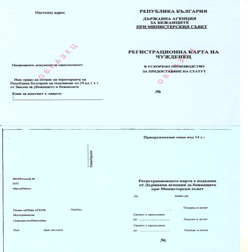
-
The card contains the following data:
- name and a photograph
- date of birth
- sex (man or woman)
- place of birth
- nationality (citizenship)
- accompanying children aged under 14
- your personal number in Bulgaria
- the address of your accommodation in Bulgaria – a refugee camp or accommodation outside the camps
- the area surrounding the camp in which you are allowed to move without the explicit permission of the Agency for Refugees.
This card serves to certify before the Bulgarian authorities that you are an asylum-seeker and are entitled to stay in Bulgaria till the procedure is completed with a decision on your case.
The registration card is a temporary document. The card usually has a 3-month term of validity which can be renewed without any problems while the procedure is still underway and till the decision on your case becomes final. This means that the registration card can also be renewed during court procedures.
The registration card is valid while you are in the asylum procedure and is usually issued with a 3-month term of validity. If your procedure has not been completed, and the term of validity will expire soon, you have to go to the Agency for Refugees where the term will be extended.
The registration card allows you to legally reside in Bulgaria while being in the procedure. You have to show it when the police stop you for a check, as well as when you go to state institutions, the court or a healthcare establishment for treatment.
The registration card allows you to work after 3 months from your registration at the Agency for Refugees. The Agency will issue a work permit for you, if you request it.
The registration card does not enable you to:
- visit the border areas or leave Bulgaria;
- contract a marriage;
- open a bank account and receive cash transfers.
When you receive a status you are entitled to a permanent card.
If you have received refugee status, you are entitled to a card of a refugee. It has a 5-year term of validity.
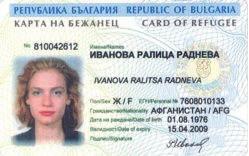
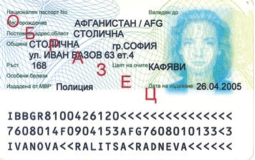
If you have received humanitarian status, you are entitled to a card of an alien with humanitarian status. It has a 3-year term of validity
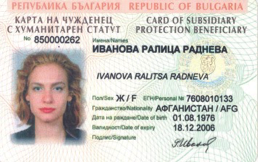
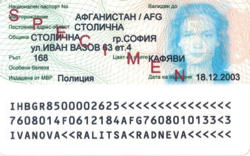
The card of a refugee has a 5-year term of validity, and the card of an alien with humanitarian status has a 3-year term of validity, but this is not the term of the status, it only indicates the validity of the document. If the term of the document expires, it can be extended for another new term.
In order to have a card issued, you need to receive a unique civil number (EGN) from the administration of the municipality where you reside. In order to receive the unique civil number, when you go to the municipality you must have with you the registration card, the original decision for granting a status, as well as a special letter from the Agency for Refugees to the mayor of the municipality about the address at which you have chosen to reside. You will not pay a fee for the issuing of the unique civil number.
The card is issued by the police – the Ministry of Interior (MOI) through the police department in charge of the area where your address is located. You have to fill in a form and pay the fee for the issuing.
In addition to the card, you can also ask for the issuing of a document for travelling abroad (a travel document) by paying an additional fee.
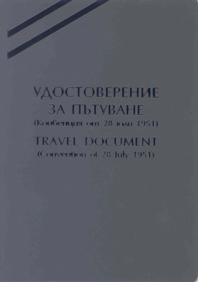
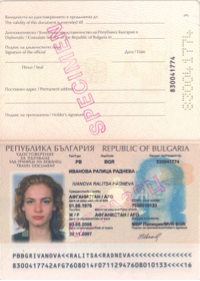
8. UNACCOMPANIED CHILDREN
Under the Bulgarian law a child is a person who has not turned 18 years of age.
Before you turn 18, you cannot independently conduct procedures before the Bulgarian authorities. If you are aged under 14, one of your parents has to sign for you in the asylum procedure. If you are aged above 14 but have not yet turned 18, you can sign before the Bulgarian authorities but your signature must be certified with the signature of one of your parents – mother or father.
If, however, you have not turned 18 and entered Bulgaria alone, without either of your parents – mother or father – then under the Bulgarian law you are an “unaccompanied child”.
If your parents are not with you in Bulgaria, because you do not know where they are, they got separated during the trip or are dead, you have the right to lodge an application for asylum in Bulgaria before the authorities without their signature, and request a status from the Bulgarian state in order to stay and live here.
PLEASE, ask about your rights someone from the assisting organisations which are present in your refugee camp!
Even though you can lodge by yourself an application for asylum before the Bulgarian authorities, the procedures for examining the application are complicated; this is why you need an adult person to help you during this procedure and to sign together with you all the documents you are given by the Bulgarian authorities.
If your parents are not with you in Bulgaria, but you are with other relatives of yours – for example: grandmother, grandfather, aunt, uncle, as well as an elder brother or sister (if they are aged above 18) – the law allows that they sign instead of you or together with you in all the procedures and on all the documents from the Bulgarian authorities.
In this case, if you sign a declaration of consent the Bulgarian authorities may designate such a relative as the person accompanying you for the duration of your asylum procedure in Bulgaria.
If you are in Bulgaria without your parents or other relatives accompanying you, the Bulgarian authorities must appoint a special person responsible for your case. This person is your "lawyer" and can be either a man or a woman.
This lawyer is responsible for ensuring that your procedure is conducted properly and is tasked with protecting your rights. The Bulgarian state pays this person, so you do not have to pay anything for their help in protecting your rights.
The officer from the Refugee Agency who is in charge of your case must, no later than 7 days after your registration, give you a document that states the name of the lawyer appointed to assist you during the asylum procedure and how you can contact him or her.
Your lawyer must meet with you before the Refugee Agency invites you for an interview, in order to answer any questions you have about the procedure in Bulgaria and your case.
The lawyer is required to be present with you during all interviews with the Refugee Agency, as well as any time you are asked to sign a document. No one has the right to make you sign any documents if your lawyer is not with you.
The social worker is a civil servant who makes sure, separately from the representative, that your rights during the procedure are observed. The social worker can be a man or a woman.
The social worker must also attend the interviews conducted with you at the Agency for Refugees.
In addition, the social worker has to check if you have everything you need in the room in which you are accommodated in the refugee camp. The social worker is obliged to talk with you and make sure that you feel safe and are not disturbed by anyone, as well as check if you receive your food regularly, if you are in good health, and make arrangement for you to attend school.
You have the right to request that the interviewer arranges a meeting with a social worker whenever you have questions or problems to solve.
In order to get assistance for the issuing of Bulgarian documents after receiving the status, and in relation to issues such as housing, social assistance, enrolment of children at school and other similar matters, you can approach the following organisations:
The offices of the Bulgarian Helsinki Committee are at the following addresses:
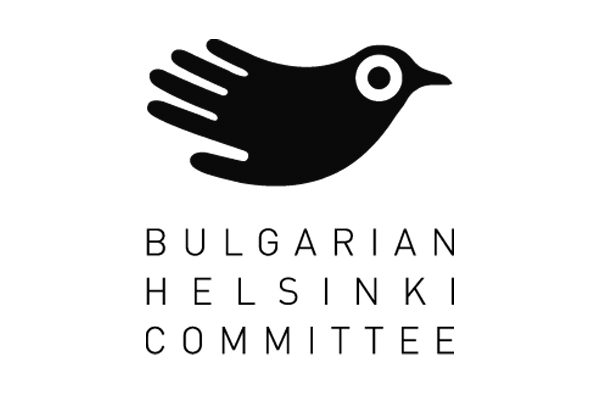
BULGARIAN HELSINKI COMMITTEE - SOFIA
Address: Sofia, 1 Uzundzhovska str., floor 3
Telephone: 00 359 2 981 3318
Telephone: 00 359 2 980 2049
Web site: www.bghelsinki.org

BULGARIAN HELSINKI COMMITTEE - SVILENGRAD
Address: Svilengrad, 5 General Strukov str.
Telephone: 00 359 379 63 118
Web site: www.bghelsinki.org

BULGARIAN HELSINKI COMMITTEE - HARMANLI
Address: Harmanli, 23 Druzhba neighbourhood Administrative building of the Refugee Camp, floor 1
Telephone: 00 359 2 980 2049
Web site: www.bghelsinki.org
If one or both of your parents are in another European state, you have the right to ask from the Bulgarian state to ensure that you go to them in that state.
You can also ask to be sent to another European state when another close relative of yours is there – for example: a grandmother, grandfather, aunt, uncle, adult brother or sister.
This is why you have to immediately inform about this the interviewer at the Agency for Refugees who is responsible for your procedure. If you have documents proving your kinship with the relevant persons in the other state, you have to give them to the interviewer. You must sign a declaration declaring that you agree to go to the other European state.
The permission for you to go, however, is not given by Bulgaria, but by the other European state. You may have to wait for this permission for one or two months. You had better wait for the permission, because, if you receive it, you will be able to travel legally to the other European state. If, however, you decide not to wait for it and run away from Bulgaria to that European state, your risk being taken back to Bulgaria, because you did not observe the legal procedures.
When the permission to travel to the other European state is received, the Bulgarian authorities will prepare your travel documents and will make arrangements for your trip.
If the other state, however, refuses to receive you on its territory, then your relatives will have to object to this refusal before the court in that state.
Even if you are still aged under 18, you have rights which the Bulgarian authorities are obliged to observe.
During the procedure you have the right to:
- stay in Bulgaria till a decision is made on whether you will receive a status;
- receive a registration card which will be your identity document;
- be accommodated in a refugee camp;
- receive food three times every day;
- receive cash assistance every month;
- be provided with medical care when you get sick;
- be enrolled in a Bulgarian school ;
- have an interpreter, a lawyer and a social worker during the interviews;
- receive a decision on whether you are granted a status in Bulgaria.
If someone offers to become your guardian against payment, this is illegal , and you must immediately inform about this – your lawyer is the best suited person to inform.
- receive Bulgarian identity documents from the Bulgarian police – an identity card and a travel document;
- get education in Bulgarian state schools and universities;
- get permission to reunite with your family on the territory of Bulgaria;
- work after you turn 18 without the need for a special permission for that;
- be granted Bulgarian citizenship: 3 years after receiving a refugee status, and 5 years after receiving a humanitarian status;
- travel abroad: under the terms for Bulgarian nationals (if you have a refugee status) and under the terms for foreigners holding a permanent residence permit (if you have a humanitarian status).
If you receive a decision refusing a status, it is very important to immediately inform your representative and your lawyerif they were not with you when the interviewer gave you this decision and asked you to sign!
If you do not have a lawyer and cannot get in touch with your representative, you must immediatelygo to one of the offices of the Bulgarian Helsinki Committee in order to be helped by their lawyers.

BULGARIAN HELSINKI COMMITTEE - SOFIA
Address: Sofia, 1 Uzundzhovska str., floor 3
Telephone: 00 359 2 981 3318
Telephone: 00 359 2 980 2049
Web site: www.bghelsinki.org

BULGARIAN HELSINKI COMMITTEE - SVILENGRAD
Address: Svilengrad, 5 General Strukov str.
Telephone: 00 359 379 63 118
Web site: www.bghelsinki.org

BULGARIAN HELSINKI COMMITTEE - HARMANLI
Address: Harmanli, 23 Druzhba neighbourhood Administrative building of the Refugee Camp, floor 1
Telephone: 00 359 2 980 2049
Web site: www.bghelsinki.org
The lawyer has to immediately write an appeal to the courtagainst the decision of the Bulgarian authorities refusing you a status.
The appeal has to be signed by you and your representative and taken to the refugee camp where you were issued the registration card.
The staff of the camp of the Refugee Agency are obliged to receive your appeal and give you back a copy which is stamped and dated.
The appeal must be lodged within a certain time limit from the day on which you received the decision refusing you a status.
You must keep the copy of the appeal with the stamp on itand take it to the lawyer who was with you during the interview or to the lawyers of the Helsinki Committee, if they wrote your appeal.
After some time you will receive, at the address where you live, a notice from the courtindicating the day and time when your case will be heard by the judicial authorities. You have to take this notice to the lawyer who was with you during the interviews.
If you did not have a lawyer during the interviews at the Agency for Refugees and your appeal was written by the lawyers of the Helsinki Committee, you have to take the notice from the court to them and they will tell you who will accompany and help you during the procedure before the court.
9. FAMILY REUNIFICATION
Both in case you received a refugee status and a humanitarian status, you have the right to request reunification with your family on the territory of Bulgaria.
The law allows reunification only with the following members of the family:
- husband / wife;
- the parents of either of the spouses who are not able to take care of themselves due to advanced age or serious illness and have to live in the same household with their children;
- the children who are aged under 18 and are not married;
- the children who have turned 18 and are not married but only if for very serious health reasons are not able to ensure their subsistence on their own.
If you are a child aged under 18 and are in Bulgaria without your parents, because they are dead or you do not know their whereabouts, you can receive a permission for reunification in Bulgaria with another adult member of your family who is responsible for you by law or by custom – a grandfather, a grandmother, an uncle, an aunt, as well as an elder brother or sister who are aged above 18.
In order to get permission for family reunification, you have to lodge a written application to the Agency for Refugees which issues such permission.
Documents certifying the marriage and the children’s birth, if you have them with you, have to be attached to the application. If you do not have these documents, you have to attach a declaration with the names, the dates of birth and the whereabouts of the members of your family (state and address) which must be certified by a notary.
After you receive the permission for family reunification, the Bulgarian authorities will send this information to the Bulgarian embassy in the country where your family is. Your family will have to go to the embassy in order to have a visa stamped on the passport. If your family members do not have passports, the embassy can issue them Bulgarian travel documents (laissez-passer) which will allow them to travel to Bulgaria.
If you do not know where your family is, you can ask the Agency for Refugees to take actions for tracing them. In this case the staff of the Agency for Refugees will approach the UN High Commissioner for Refugees and the Bulgarian Red Cross for assistance in tracing the family outside Bulgaria.
In case you receive refusal for family reunification, you have the right to lodge an appeal to the court and request that the court revoke the refusal and order the Agency for Refugees to issue permission for reunification.
The appeal against the refusal for your family to reunite with you in Bulgaria must be lodged to the court within 14 days (2 weeks) from the day on which you received the refusal against your signature.
The appeal has to be lodged before the administrative court with jurisdiction over the area where you live and within which the address on your registration card is located. You are entitled to appeal at two court instance – if you are not happy with the decision of the first court, you can lodge an appeal before the Supreme Court of Bulgaria. The decision of the Supreme Court will be final.
In relation to writing the application, you can approach the lawyers of the Helsinki Committee who provide free legal aid and can help you and consult you on any issues related to the asylum procedure and the appeal.
If you want to lodge an appeal before the court, visit an office of the Helsinki Committee immediately after receiving the decision in order not to miss the deadline for the appeal.
If you want to hire a lawyer who will help you with the court procedure, inform the Helsinki Committee about this. Its lawyers will write a special application requesting the appointment of a free-of-charge lawyer by the court.
The lawyer appointed by the court will not have the right to ask for money from you in order to represent and defend you during the court procedure, because such a lawyer is paid by the Bulgarian state.
10. VOLUNTARY RETURN
In case you no longer fear returning to your country of origin, because the reasons for which you fled have ceased to exist, you can receive assistance and support if you decide to voluntarily return to your state.
You have the right to take actions for voluntary return also in case you were refused a status, which was confirmed by the court and thus the decision became final. If the decision refusing you a status is final, you lose the right to stay in Bulgaria and may be deported back to your country of origin by the immigration police. In this case you will also be imposed a prohibition on entry into Bulgaria for a period of up to 5 years, which is also valid for all the other states of the European Union.
In order to avoid deportation and the prohibition on entry, you can yourself decide to undertake voluntary return, if the reasons for which you fled your country have ceased to exist.
In order to initiate such voluntary return, you have to file an application to the Migration Directorate (the Bulgarian immigration police). If you do not have a travel document or money for a ticket, you can ask the Migration Directorate for assistance.
Such assistance for documents and tickets can also be provided by the International Organisation for Migration (IOM).
IOM has programmes for financial support for voluntary return, as well as for reintegration in the country of origin. The reintegration measures may include:
- medical help and purchasing of medication;
- psycho-social and health support;
- education for children;
- re-training courses and employment counselling;
- provision of consultations and financial support when a business plan for starting up a small business is presented;
- other measures facilitating successful reintegration.

INTERNATIONAL ORGANISATION FOR MIGRATION
Address: Sofia, 77 Tzar Assen str.
Telephone: 00 359 2 93-94-774
Web site: www.iom.bg





